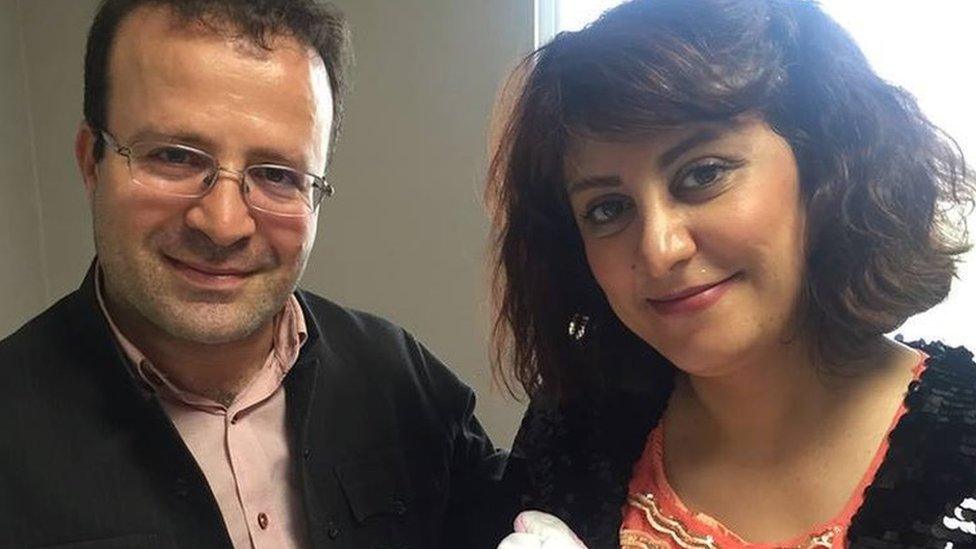Kameel Ahmady: British FGM academic 'jailed in Iran'
- Published

Kameel Ahmady, pictured with his wife Shafaq Rahmani, was arrested in August 2019
A British-Iranian academic has been sentenced to eight years in prison by a court in Tehran, his lawyer says.
Kameel Ahmady was convicted of "collaborating with a hostile government", Amir Raesian tweeted, external.
One local news agency said he was given a nine-year sentence for illegally receiving funds from institutions trying to topple the Iranian regime.
Mr Ahmady is an anthropologist who has studied child marriage, female genital mutilation and sexuality in Iran.
The UK government said it was urgently seeking more information.
Iran has detained a number of Iranians with dual nationality or foreign permanent residency in recent years, many of them on spying charges.
(August 2020): The detainees held 'hostage' in Iran
Mr Ahmady, who is an ethnic Kurd, was born in north-western Iran and moved to the UK in his 20s, studying at the London School of Economics.
In 2015, he published a study suggesting that tens of thousands of Iranian women had undergone female genital mutilation. Until then, Iran had not been widely recognised as a country affected by FGM.
Mr Ahmady had been living in Iran for several years before his arrest in August 2019, according to the Kurdistan Human Rights Network, a France-based advocacy group.
The academic said he spent 100 days without access to a lawyer before he was allowed out on bail.
On Sunday afternoon, Mr Raesian tweeted that Mr Ahmady had been sentenced by Branch 15 of the Revolutionary Court in Tehran to eight years' imprisonment after being convicted of "collaborating with a hostile government" and that he planned to appeal.
However, the Tasnim news agency reported that Mr Ahmady had been sentenced to nine years in jail and fined €600,000 ($730,000; £545,000) for accumulating wealth through unlawful means from institutes seeking to overthrow the Iranian regime.
The news agency, which is linked to Iran's hardliners, said he was also accused of seeking "cultural changes" related to women and children, and that he had allegedly been in contact with foreign media and with the embassies of European countries with the aim of "promoting homosexuality" in Iran.
There was no immediate comment from the Iranian judiciary.
Mr Ahmady wrote on Facebook that the judgement followed a "legal process full of flaws".
"The legal focus of the accusation goes back to my research on the most harmful traditions about children in disadvantaged minority areas of Iran, but the main intention of my accusers has been to link my research to the United Nations 2030 Sustainable Development Goals, and to stop my activities with the target community of my research," he added.
Mr Ahmady is one of a number of British-Iranian dual nationals being detained in Iran, including the charity worker Nazanin Zaghari-Ratcliffe and engineer Anoosheh Ashoori.
A spokesperson for the UK Foreign, Commonwealth and Development Office said: "We remain deeply concerned about all our dual British nationals detained in Iran."